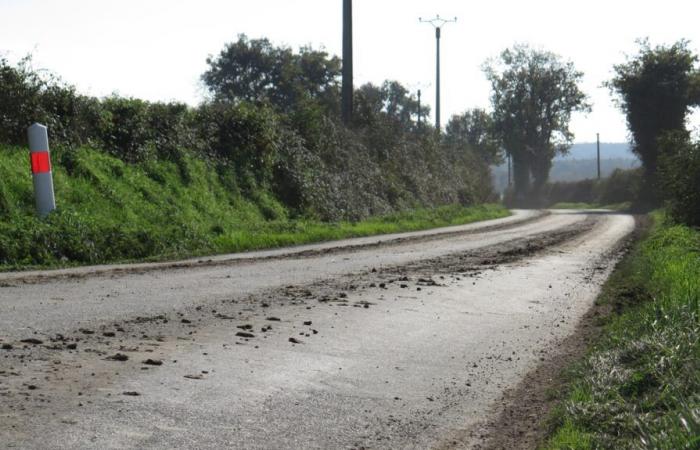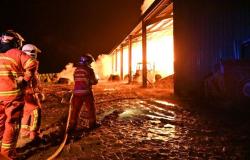“One of our constituents who is a motorcyclist almost fell and went into a ditch. He was very angry because he had not been warned that there was mud. » Mayor of the commune of Cours, Catherine Gourmelon published a post on the municipal Facebook page “for the attention of our farmer friends” to alert you to the situation.
The message posted by the Cours town hall.
© (Screenshot of the Facebook page “Cours commune de Gâtine”)
As in the entire department of Deux-Sèvres, the small town of Gâtine has been facing a problem of depositing earth on the roads for a month, making them dangerous for users, especially two-wheelers. At issue: seasonal agricultural work in this particularly rainy fall of 2024. At silage time, the fields are waterlogged and harvests are difficult for farmers. Consequence: when leaving the fields, tractors leave deposits of earth making the road very slippery in places.
“An extremely slippery mud lake”
“People complained this year. After receiving calls from local residents, I published this message. I understand farmers. They have to work and they haven't been spoiled by the weather.” recognizes Catherine Gourmelon. “But there are laws. One road was monstrously dirty. It was an extremely slippery mud lake. » The mayor therefore contacted the farmers concerned: “They understood very well. We asked them to clean and at least put up signs to warn the population and so that everyone can adapt their behavior, like when there is fog. »
“People of all ages insult us”
On the agricultural side, some have also expressed a certain annoyance this year: “This is the first year that we have been questioned like this, in Deux-Sèvres as in Vienne. People of all ages insult us, make fishtails at us or honk their horns. The closer we are to big cities, the more problems we have,” castigates Éric Retailleau, the president of the union of agricultural entrepreneurs of the Poitou territories. “For silage, we do a lot of back and forth. We put up signs and clean with blades that scrape the road and brushes. But not every time. Cleaning is done two to three times during the day. We try to do as much as possible, prevent, clean up. We are aware of the risk, the embarrassment, but we also have to work and we don't have to be insulted. »
“We can’t clean every turn”
Farmer near Mauléon, Christophe Godet explains that during this period of harvesting corn to make fodder, “we take a trailer out of the field every quarter of an hour” with therefore a high rate of back and forth trips. “We have sweepers and slurry tankers which send water with pressure to clean, but we cannot do it every turn. » However, traffic continues during this time. “There are cars passing and compacting the earth. The rotating broom system is itchy but not enough to clean well,” in cases where the earth has been crushed. The organic breeder assures that this is a concern: “We farmers are not proud”hear “not reassured” because they have to work but are aware of the risk generated and “In the event of an accident, we are responsible”.
The best way to share the road with the least risk and the most understanding in his eyes remains prevention. Already, “we put up signs” warning of the risk of slipping. Better yet, he welcomes the information provided locally upstream: “My municipality played the game well. It sent a message to residents to explain that there was agricultural work and that given the weather conditions, the roads were going to be dirty. » The mayor of La Petite-Boissière, Joël Barraud, who ordered additional panels, confirms this sending of emails “to provide service and prevent”. Message received and appreciated, according to Christophe Godet: “My neighbors who are not from the industry stopped when I was sweeping. They understood why we were dirtying the roads. We exchanged. It's nice, it brings comfort to the heart. »
What does the regulation say?
When questioned, the prefecture services replied that “there are no specific regulations aimed at farmers, the regulations concern all road users (individuals, public works companies, etc.)”.
In the event of such deposits of earth, there is an obligation to “signalize the dangerous area to road users in order to encourage them to slow down; the installation of this signage is the responsibility of the person responsible for the mud deposits.” With this precision: “Temporary signage is put in place in both directions of traffic (distance of approximately 150 meters upstream and downstream of the soiled area) so as to be clearly visible, and to be renewed every 500 meters if necessary. »
As for the panels themselves, “regulatory, they must be retroreflective”designating a slippery road surface and “mud”, “weighted and judiciously located on the shoulder to be visible and avoid being soiled”.
Please note, the obligation to report mud on the road does not exempt you from all liability, this must also be removed. “Putting up traffic signs will not release all liability; the courts, in the event of an appeal, will be able to assess whether the means put in place were appropriate to the danger created. »
Offenders face fines of between €1,500 and €3,000 in the event of a repeat offense. In the event of an accident, they are exposed to paying much higher damages, or even imprisonment in the most serious cases.






